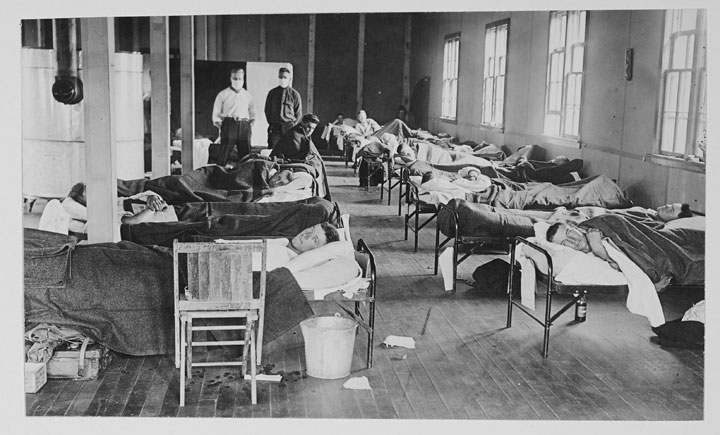During a 1950s polio epidemic, some quarantined Newfoundland schoolchildren watched their lessons on television. Maureen Peters’ aunt told her their family could not afford to own a TV set, and sometimes they had to watch through a neighbour’s window.

Now, with the world in the grip of the COVID-19 pandemic, Peters is seeking out similar stories and items for a collection at the provincial gallery and archive where she is the acting curator of history.
READ MORE: N.B. youth shares story of 106-year-old great grandmother who has lived through two pandemics
In a phone interview from St. John’s, Peters said The Rooms is eager to document how people are coping with the current pandemic to build a record for the future.
“You look into the history and go, ‘We’ve had four other pandemics at least hit Newfoundland since the 1850s, and stuff wasn’t collected,”‘ she said.
“So what can we collect now to … support the story going forward?”
Peters said parallels are emerging between the current lockdown and the polio quarantine – for example, children in cities such as St. John’s could more easily transition to online lessons this spring than their rural peers who don’t have internet connectivity at home.
The exhibition, which follows three themes, will be presented online and possibly at The Rooms once the facility can reopen and let guests inside.

The first category includes items made in direct response to COVID-19, such as face masks and hand sanitizer produced by the Newfoundland and Labrador Liquor Corporation for public service workers.
“The other one would be the creative things that you have kind of always wanted to explore, but haven’t had a chance to because (of) not having the time to do it,” Peters said. One man living in a coastal area, for example, has used the downtime to start making sculptures out of driftwood found near his home.
The last section will look at the history of pandemics and quarantines in Newfoundland and Labrador.
READ MORE: How the City of Toronto responded to the Spanish Flu in 1918
Along with hand-crafted items produced by people in isolation, The Rooms is also partnering with The Heritage Foundation of Newfoundland and Labrador for an oral history.
Heritage Foundation folklorist Dale Jarvis is gathering personal stories, songs and testimonials from people living through the lockdown, taking submissions through telephone interviews, personal recordings and an online survey.
While the process is in its early stages, Jarvis said creativity and resourcefulness are emerging themes, as people try out new food preparation and craft skills.
He’s also looking to reach seniors, newcomers to the province and health-care workers to speak to their unique experiences.
The Rooms is one of many Canadian museums, archives and universities jumping at the chance to record history in the making, from a regional or national experience.
Jarvis said he’s been interested to see how myths and urban legends have spread during this pandemic and past outbreaks.
‘The human condition’
He had spoken with people who remembered swimming pools that were shut down because of polio in the 1950s, but after digging into records, he found they were actually closed for unrelated health reasons.
“Whether or not things are true, they tend to flow in communities in the same way,” Jarvis said, pointing to “folk cures” like gargling vinegar spreading online during COVID-19.
“Why do we respond consistently across time with misinformation and with urban legends when we have good medical advice available to us? I find that really, really interesting. It says something about the human condition, I think.”
Peters said a major difference with the current outbreak is that people can stay connected online, allowing some of Newfoundland and Labrador’s characteristic humour to shine through in the material, like a mask made on Corona beer-patterned fabric.
Artist Jaimie Feener’s cross-stitch art based on Health Minister John Haggie’s one-liners at daily COVID-19 briefings have gone viral among Newfoundlanders and Labradorians. The Rooms snagged Feener’s rendering of Haggie’s plea that parents stop their from children from licking shopping cart handles.

Creativity has also been evident in Jarvis’ early submissions, with one participant sending in an original “pandemic blues” song and others submitting poetry.
“There’s a lot of creativity and a lot of artistry in Newfoundland and Labrador, and it’s nice to see that being incorporated into the collection,” he said.
For now, The Rooms is happy to take photo submissions, though the facility’s conservator picked up some sanitized items from Peters’ porch for transporation to the archive.
READ MORE: Saskatchewan brides adjust wedding plans amid COVID-19
Peters is encouraging new crafters to share their work, even if they’re wondering whether it’s museum-worthy.
“We’d still be interested in seeing what you’re creating and what people are doing during this time,” she said.
This report by the Canadian Press was first published May 9, 2020.
- Canadian man dies during Texas Ironman event. His widow wants answers as to why
- ‘Shock and disbelief’ after Manitoba school trustee’s Indigenous comments
- Several baby products have been recalled by Health Canada. Here’s the list
- ‘Sciatica was gone’: hospital performs robot-assisted spinal surgery in Canadian first





Comments